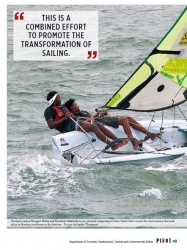Strategic Ideas To Grow The Maritime Industry - Pivot2017-06-09 The Annual Maritime Summit took place in Durban at the Maritime School of Excellence on 3 and 4 April. In keeping with the International Maritime Organisation’s theme for 2017, the theme of the summit was Connecting Ports, Ships and Communities. The Summit saw attendance form representatives of national, provincial and local government, representatives from African countries and the business sector among others. Some of the organisations represented at the Summit included: Transnet National Ports Authority, Transnet Port Terminals, the Durban Chamber of Commerce and Industry, the KZN Sharks Board Maritime Centre of Excellence and eThekwini Municipality.
Mr Sihle Zikalala, who addressed the conference delegates said, “We want to congratulate the eThekwini Maritime Cluster for having conceptualised this yearly convergence of industry stakeholders and interested parties. This gives all those responsible for the development of our country and province’s ocean economy the opportunity to make a collective assessment and appreciation of whether or not there is any progress in our efforts to turn the maritime sector into one of the key levers for accelerated socioeconomic transformation in this country.†Discussions took take place with maritime industry experts and centred on:
development†said Mr Sobantu Tilayi, South African Maritime Safe Authority (SAMSA) acting Chief Executive standing in for Deputy Minister of Department of Transport, Sindisiwe Chikunga. Mr Zikalala said, “The importance of collaboration between government and public sector in building a thriving ocean economy cannot be overemphasized and it is indeed encouraging to see such integration here.†According to Thato Tsautse, MD of the eThekwini Maritime Cluster, technological innovation is the key to creating sustainable connections and was a focus during the event. Mr Siyabonga Gama, Transnet Group CEO confirmed that South African maritime industry is ready to expand to other African countries for market and marine services. “We are poised and ready to do business in Africa,†he said. SMART PORTS The ports of 2030 are going to look very different to today’s ports, said one of speakers Mike van Tonder, IT and Service Line Leader for engineering consulting firm Aurecon. According to van Tonder, the two key technological trends heading towards 2030 are the real time tracking of containers (from loading to unloading) and the development of smart ports. Real time tracking requires the creation of Apps that allow customers, container owners and shipping agents to follow their containers from first loading to final unloading in real time. These will enable regular updates on all the processes and clearances that the containers have to undergo along the way. But this is part of a much bigger picture, which van Tonder believes is the most exciting âˆ' the development of smart ports. “This is going to create a lot of turbulence in the shipping world. Twenty years ago, you had big burly stevedores loading and unloading freight. Now you have a 23-year-old female IT graduate with fine motor skills remotely supervising driverless vehicles! This is going to cause huge disruptions to the way that ports are run,†he explains. Tsautse agreed, pointing out that the obvious result will be the creation of World Port Cities. “These will be locations where port economies and the physical exchange of merchandise will be linked with urbanised service economies in the form of finance, insurance, legal and technology services,†she says. Ports, by their nature, tend to be the most globalised of industries due to the very nature of international trade and shipping. They create a pipeline that pumps capital, skills, data, knowledge and intelligence into local port-city economies. This is a highly relevant avenue of urban growth, ultimately leading to international business service centres. She pointed out that the Port of Durban is far advanced in this new development of the cross-over between the city and the port. The Back of Port development, the Maritime School of Excellence and the planned Durban Dig Out Port are just a few elements of the integration of City and port. “It’s hugely exciting, mainly because a port is a closed environment where a lot of experimentation and development can take place. We can play with technologies within the closed port environment and then apply these further afield,†van Tonder said. MARITIME CAREER EXPO In relation to the various segments of the summit, a successful maritime career expo was held where students were given the opportunity to engage with maritime industry experts and be educated on the various opportunities that exist within the maritime sector. Presentations focussed on the National Cadet Training Programme, careers in terminals and ports, opportunities at various institutions including the cruise industry, the role of civil engineering in the maritime industry and maritime qualifications overview from the Durban University of Technology and the University of KwaZulu-Natal. This event well portrays the commitment by all stakeholders to advance youth and career development. SAILING REGATTA In addition, a sailing regatta was organised by the eThekwini Maritime Cluster, the Sail Africa Youth Development Foundation, Royal Natal and Point Yacht Clubs, and supported by SA Sailing and eThekwini Municipality Sport and Recreation. The event saw over 50 youth participating in three days of racing in Durban harbour that culminated in an evening of prize giving. “Sailing as a sport has always been for a selected few that can afford access to such facilities the consequence is that many youth living in Durban and other port cities have not had the opportunity to become familiar with the maritime environment, despite living close to the coast. This is a combined effort to promote the transformation of sailing through this regatta,†said Tsautse. |
Strategic Ideas To Grow The Maritime Industry - Pivot
Copyright © 2024 KwaZulu-Natal Top Business
